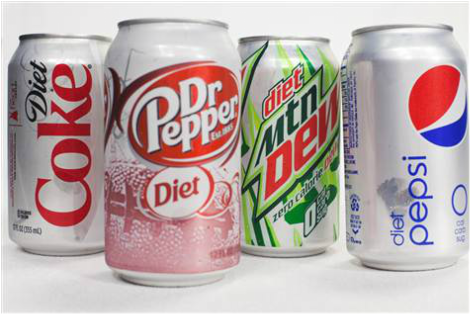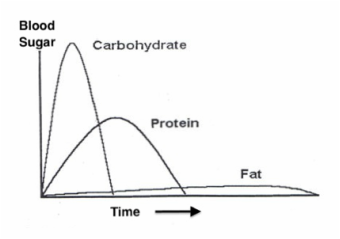Are diet foods & drinks confusing your metabolism?
 Aspartame, Cyclamate, Sucralose, Saccharin; there are many different artrificial sweeteners
Aspartame, Cyclamate, Sucralose, Saccharin; there are many different artrificial sweeteners
The simple answer is YES!
Low-fat diet foods make you put on weight because contrary to what the diet experts tell us, losing weight is not just about calories-in and calories-out. How can that be? Diet foods and drinks have fewer calories and in particular less fat, so they must make a positive contribution, mustn’t they?
Let's take a look at some recent research. It involved 21 overweight and obese young adults and was conducted at Children's Hospital Boston and Brigham and Women's Hospital, Boston, Massachusetts, between June 16, 2006 and June 21, 2010. They ate either a low-fat diet (60% carbs, 20% fat, and 20% protein); a middling diet (40:40:20) or a very low-carbohydrate diet (10% carbs, 60% fat, and 30% protein) in random order, each for 4 weeks. During this time, they consumed the same total amount of calories, yet found that after using the low-fat diet, they burned 300 calories less per day! Their bodies had effectively become less efficient, recognizing that something was going on and so they went into a kind of reserve mode.
While they all lost weight, their metabolism (measured by Resting Energy Expenditure) was effectively slowed down by eating the low-fat diet. In another study, this one involving 66,118 women over a 14 year period, researchers found that diet drinks may be worse health-wise than sugar-sweetened drinks, when it comes to losing weight. The results give real cause for concern:
By confusing your body with artificial sweeteners, you slow down your metabolism. In other words, you burn fewer calories while eating low-fat ready-made foods and ‘diet’ drinks which is why, at the end of the day, they promote weight gain.
Low-fat diet foods make you put on weight because contrary to what the diet experts tell us, losing weight is not just about calories-in and calories-out. How can that be? Diet foods and drinks have fewer calories and in particular less fat, so they must make a positive contribution, mustn’t they?
Let's take a look at some recent research. It involved 21 overweight and obese young adults and was conducted at Children's Hospital Boston and Brigham and Women's Hospital, Boston, Massachusetts, between June 16, 2006 and June 21, 2010. They ate either a low-fat diet (60% carbs, 20% fat, and 20% protein); a middling diet (40:40:20) or a very low-carbohydrate diet (10% carbs, 60% fat, and 30% protein) in random order, each for 4 weeks. During this time, they consumed the same total amount of calories, yet found that after using the low-fat diet, they burned 300 calories less per day! Their bodies had effectively become less efficient, recognizing that something was going on and so they went into a kind of reserve mode.
While they all lost weight, their metabolism (measured by Resting Energy Expenditure) was effectively slowed down by eating the low-fat diet. In another study, this one involving 66,118 women over a 14 year period, researchers found that diet drinks may be worse health-wise than sugar-sweetened drinks, when it comes to losing weight. The results give real cause for concern:
- Diet sodas raised the risk of diabetes more than sugar-sweetened sodas!
- Women who drank a small diet soda daily had a 33% increased risk of Type 2 diabetes; drinking a large soda led to twice that risk.
- Women who drank diet drinks drank twice as much as those who drank sugar-sweetened sodas.
By confusing your body with artificial sweeteners, you slow down your metabolism. In other words, you burn fewer calories while eating low-fat ready-made foods and ‘diet’ drinks which is why, at the end of the day, they promote weight gain.
